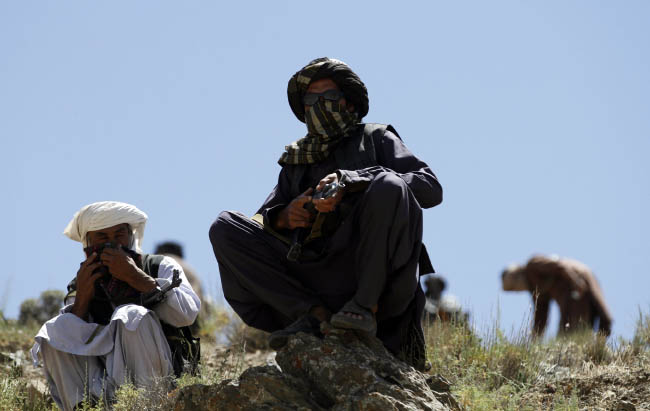With the intensification of attacks against the Taliban fighters, militancy has decreased. The Taliban seek to continue their deadly attacks in the wake of coming under heavy offensives of Afghan soldiers, who have multiplied their military campaign against terrorists.
Within almost a decade, Afghan government frequently called the Taliban guerilla fighters and other warring parties to lay down their arms and hold negotiations. The Taliban were told that spilling the blood of civilians, including women and children, would never benefit them and they had better resolve their issues through negotiations. With the view of bringing the Taliban to negotiating table, Hamid Karzai’s administration left no stone unturned. Karzai formed the High Peace Council (HPC), which was tasked to persuade the Taliban to hold talks, and travelled to Pakistan for twenty-one times to nudge the Taliban, with the help of Pakistani officials, to peace table.
After all, Karzai’s administration released a number of the Taliban’s prisoners, who were deemed dangerous by the US officials, to fulfill their precondition and make them stop violence and bloodshed. Nevertheless, the Taliban continued their insurgency and the released prisoners returned to battlegrounds. In short, the Taliban have constantly held out against peace process and played a foul game in this regard.
In the last days of Obama’s administration, the military mission of the US soldiers decreased to advisory rule and the bulk of forces withdrawn from Afghanistan, which left the country in the lurch and filled the air with a sense of disappointment.
This issue further emboldened the Taliban to intensify their attacks which led to the takeover of Kunduz province. Meanwhile, Afghan soldiers sustained heavy casualties. The withdrawal of US soldiers also indicated that the “war on terror” did not bear the desired results. With the unmitigated militancy, it was feared that Afghanistan would change into a second Iraq. But this fact was overlooked by the US former President Barack Obama who promised during his presidential campaign to withdraw the US soldiers from Afghanistan. He fulfilled his promise despite the fact that militancy would be aggravated.
Putting tribute to the “sacrifice of blood and treasure” within the seventeen-year-conflict in Afghanistan, which was the longest war in the history of America, the US incumbent President Donald Trump sought to intensify attacks against terrorism and increase the number of US soldiers in Afghanistan. He said, “A hasty withdrawal would create a vacuum for terrorists, including ISIS and Al Qaeda, would instantly fill just as happened before Sept. 11. And as we know, in 2011, America hastily and mistakenly withdrew from Iraq. As a result, our hard-won gains slipped back into the hands of terrorist enemies.
Our soldiers watched as cities they had fought for and bled to liberate, and won, were occupied by a terrorist group called ISIS. The vacuum we created by leaving too soon gave safe haven for ISIS to spread, to grow, recruit and launch attacks. We cannot repeat in Afghanistan the mistake our leaders made in Iraq.”
Considering the escalated militancy and calling the hasty withdrawal of US soldiers a “mistake”, the Trump’s administration seeks to strengthen its attacks against the Taliban fighters and their hideouts. This decision is welcomed by both Afghan state and nation and fills the air with a glimpse of hope. Indeed, this is a right decision when the Taliban outfit holds out against peace parley and never stop violence and bloodshed.
On the other hand, the Taliban elements intend to increase their terrorist attacks against both combatants and non-combatants in Afghanistan. The recent attack on Intercontinental Hotel in Kabul, which was claimed by the Taliban, indicates this fact. The Taliban’s hardliner leader Mullah Haibatullah is most likely to follow his predecessor’s footstep – i.e. refuses to hold talks and intensifies violence and insurgency. It is believed that whether Afghan government, along with its international allies, fights the Taliban or calls them to hold talks, the Taliban will not decrease violence. Now which one will be an effective strategy to combat terrorism: military action or peaceful method?
Despite the years of efforts made by Kabul government to bring the Taliban to peace table, the Taliban elements held out against it and continued violence and bloodshed across the country. Currently, military deal seems to be the only option to be adopted by Afghan government and its international allies.
Home » Opinion » What is Next after Fruitless Talks?
What is Next after Fruitless Talks?
| Hujjatullah Zia

